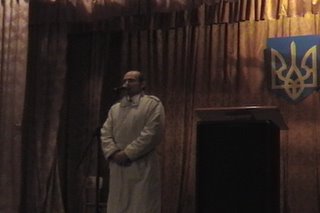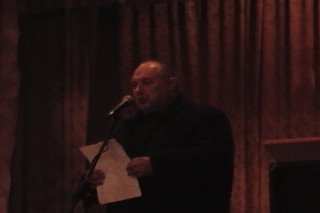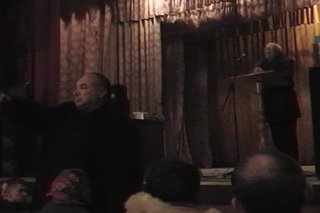I was in Pidhajtsi at the time, and I recall watching an interview on the evening of November 16, the day before town hall meetings and pickets were held, with a manager of a state run plant on 1+1, the state TV channel that up until the OR was mostly a shameless propaganda forum for Yanukovych et al. This manager, in the state of Lutsk, was just talking away, saying mostly nonsensical things, and I recall how he reminded me of Leonid Kravchuk, who if you know what I mean, is a master at talking, and talking a lot, while saying absolutely nothing. This manager had this slippery-slick feel to him, but his cunning was not quite on par with Kravchuk. To paraphrase, I remember him saying something like, "You know, its natural; there are some parties planned for that day that people want to get to, and people want to be with their families on election day, etc. Some of my people even asked me for this favor. . ." Really? He was a really bad liar. And then I recall some interviews with workers at his plant, who were all camera shy or were too frightened to say anything real. This was still pre-OR, mind you.
I was stunned. I recall looking at Oksana, who I have featured on this blog a number of times, asking her once again the same question I had asked so many other times, in reaction to the shenanigans of Ukraine's authorities and oligarchs: Is this real? She said, "Stefan, this is our. . .your Ukraine. Can you believe it?"
The next day, Oksana's father, Hryhori Kolodnytskyj (from now on, Hryts K), who is my father's cousin, came bursting into the house at lunch time to tell us that there would be a town hall meeting in the very same Narodnyj Dim that I wrote about here last week, and that was featured in last week's Ukrainian Weekly. The meetings was being held in order to discuss what action could be taken to stop this obvious plan to falsify the elections. Hryts K, by-the-way, was head of the local branch of the Fatherland Party of Yulia Tymoshenko; he later organized four buses to and fro Kyiv during the OR, and spent himself more than 10 days in the capital. He also spent the previous summer canvassing for Yushchenko in and around the Pidhajtsi area (and I went with him on occassion). Hryts has a long, personal history of fighting against corruption and authoritarianism in Ukraine, a history that includes a run-in with the KGB in the 1970s that left him in a hospital for a month. (The OR did not happen in a vaccuum, and the US did not make it happen.)
These are still-photos I have taken from my video footage of that meeting in Pidhajtsi.

This is Petro Dmitrovych Kalynjak speaking. I wrote about him here just the other day. He opened the meeting by making a call that something be done to stop this attempt at falsifying the elections. If you read what I wrote about him, you will see how there is continuity between the events of the OR and those of Ukrainian history in general. Continuity. No Vacuum. The US did not suck up a bunch of dimwitted villagers and unthinking city dwellers into unwittingly doing its bidding. . .
 I forget this fellow's name, but he is reading to the assembled the order that budget workers should turn over their right to vote to their managers.
I forget this fellow's name, but he is reading to the assembled the order that budget workers should turn over their right to vote to their managers.
 People got excited as he finished his speech, in the course of which he had said he has a list of names of people who already had turned in their registration and passports. He did not want to read out the names, but people in the crowd started shouting that they wanted to know the names.
People got excited as he finished his speech, in the course of which he had said he has a list of names of people who already had turned in their registration and passports. He did not want to read out the names, but people in the crowd started shouting that they wanted to know the names.
The man standing at the podium, by the way, is Mr. Metyk. I forgot his first name, but he is a linguist who speaks, of the Slavic languages, Ukrainian and Russian of course, but also Polish, Czech, and Slovak; then he also speaks very good English and German, as well as French and Spanish. I chatted with him frequently in my days in Pidhajtsi in the two of his 7 extra languages that I know other than English and Ukrainian--i.e., in German and Spanish--in which he was much more fluent than I. He's never been west of Ukraine. He has a gift for accuracy, whereas I have a gift for making lots of mistakes and still being understood in the languages I know in addition to English (I have knowledge also of Latvian and Russian). This includes my Ukrainian, which nonetheless is becoming better and better all the time. . . Mr. Metyk is dieing of a heart condition for which he needs medicines that he has no money to buy, and no family abroad to help him out. His speech on this day was about the dismal state of medical care and of the infrastructure in general in Ukraine, and on the need to prevent Yanukovych from winning. Read here what I have written about the infrastructure in Ukraine.
 This woman standing in the background wanted to know the names so that she could go and picket their houses.
This woman standing in the background wanted to know the names so that she could go and picket their houses.
 This is Hryts K speaking. He made a call for everyone present (maybe 200-300) to join him in a picket at the police station and at the county administration. Immediately after the meeting, he and others proceeded to the pickets. The footage of their picket in front of the police station (a large # of police had already turned over their right to vote) is on cassette #11, the only one missing from my box of footage from last year in Ukraine. I have searched for it frantically all day. Where the hell is it?!
This is Hryts K speaking. He made a call for everyone present (maybe 200-300) to join him in a picket at the police station and at the county administration. Immediately after the meeting, he and others proceeded to the pickets. The footage of their picket in front of the police station (a large # of police had already turned over their right to vote) is on cassette #11, the only one missing from my box of footage from last year in Ukraine. I have searched for it frantically all day. Where the hell is it?!
Many cities, towns, and villages had similar responses. The uproar was so great that a day or two later, Ukraine's parliament, the Verkhovna Rada or Supreme Council, passed a resolution that aimed at preventing managers from voting on behalf of their workers, as well as providing some provisions that aimed at making it more difficult for people to abuse the system to vote more than once, as they had done in the first round. However, the resolution was not binding; I forget the legalities of the whole thing, but recall only that the resolution was not passed into law before the election.
Although authorities were probably still able to use this method to falsify a good portion of the votes, in general people felt emboldened not to go along with the plan by the protests and the parliamentary resolution. Budget-workers, by the way, make up a large portion of Ukraine's work force, from those working within the government bureaucracy to those in state-run industries, especially in the publicly-privately run utilities, etc. The electricity plants that supply the Pidhajtsi region are partially owned by Surkis, one of Ukraine's wealthy and powerful oligarchs, and partly by the state; who do you think the managers would have been voting for?
I recall that all of this made me feel, at the time, two things: 1) I now felt, along with everyone else, absolutely certain that authorities were planning to repeat all their pitiful shenanigans of the first round of voting on Nov. 21; and 2), more importantly, it made me feel that this time, Ukrainians just might fight for their future.
Read here an article I had published in a local Minneapolis newspaper on this day that protests against the budget worker scandal broke out. . .
And one last thought: One of those bastards writing for the Guardian from their armchairs (not from the ground in Ukraine), either John Laughland or Jonathan Steele, had the gumption to, not just speculate, but to confidently claim, that Yushchenko would have done all the same things to falsify the elections had he been in Yanukovych's place. Oh really? I think that the writer (either Laughland or Steele) is himself cynical enough, on par with Medvedchuk, the mastermind of the whole falsification regime, to have done the same in the same shoes; however, when it comes to Yushchenko, although there is much to criticize him for, this claim makes no sense at all, when you look at his personality and personal history.
This makes me think of the statement made by a taxi driver I had in Kyiv this past trip. His name was Bohdan, and he had lived in the US for 12 years and spoke excellent English. He asked me what I was doing in Ukraine, and I told him that I was making a documentary that was in part an answer to the critics of the OR who claim that, more or less, Ukrainians were the unwitting stooges of Western machinations. He asked me what a "stooge" was, and after I explained, he said back to me, "Well, I think that such people are the stooges of their own ideologies. . ." He was an educated fellow who had read Western philosophy and had trained to be an engineer oh so long ago, another one of those fabulously interesting cabbies I have shared time with in Ukraine (another was an anthropologist cabbie in Ivano-Frankivsk who talked on and on about the castles of Halychyna. . .).
I begged him to let me film him saying this, but he declined my repeated requests by saying that he was just a taxi driver. . .






No comments:
Post a Comment